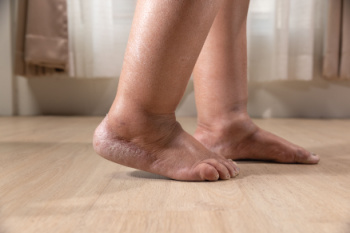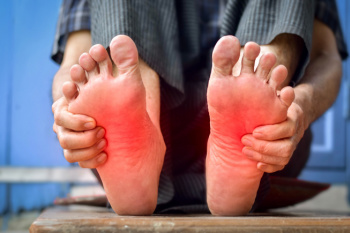Connect With Us
Blog
Items filtered by date: June 2025
Tuesday, 24 June 2025 00:00
What Swollen Feet and Ankles May Reveal About Your Health

Swollen feet and ankles can be more than just a temporary discomfort and may signal underlying health concerns. Prolonged standing or sitting, consuming salty foods, pregnancy, hormonal changes, or even insect bites can cause fluid retention in the lower limbs. While occasional swelling may be harmless, persistent or painful swelling could indicate circulatory problems, inflammation, or other medical issues requiring attention. A podiatrist can assess the cause through a physical exam, medical history, and diagnostic testing. They may recommend treatment such as compression therapy or lifestyle changes. If your feet or ankles appear swollen without clear reason or if the condition worsens, it is suggested that you consult a podiatrist to address the issue early and support long-term foot health.
Swollen feet can be a sign of an underlying condition. If you have any concerns, contact Carrie Frame, DPM of West Virginia Foot & Ankle. Our doctor can provide the care you need to keep you pain-free and on your feet.
Swollen feet are a common ailment among pregnant women and people who stand or sit for extended periods. Aging may increase the possibility of swollen feet and patients who are obese often notice when their feet are swelling too. There may be medical reasons why swollen feet occur:
- Phlebitis - A condition that causes the veins to become inflamed and can also cause leg pain.
- Liver disease - This may lead to low blood levels of albumin which is a protein. This can cause fluid in the blood to pass into the tissues and several areas of the body can become swollen.
- Heart failure - When the heart doesn’t pump properly the blood that is normally pumped back to the heart can pool in the veins of the legs causing swollen feet.
- Kidney disease - One of the main functions of the kidneys is releasing excess fluid in the body. This type of condition can make it difficult for the kidneys to function properly, and as a result the feet may become swollen.
- Deep-vein thrombosis (DVT)- This is a serious condition where blood clots form in the veins of the legs. They can block the return of blood from the legs to the heart which may cause the feet to swell. It is important to be treated by a podiatrist if this condition is present.
Swollen feet can also be caused by bone and tendon conditions, including fractures, arthritis, and tendinitis. Additionally, there may be skin and toenail conditions and an infection may cause the feet to swell. Patients who take medicine to treat high blood pressure may be prone to getting swollen feet.
Many patients elevate their feet to help relieve the swelling and this is generally a temporary remedy. When a podiatrist is consulted the reason behind the swelling can be uncovered and subsequently treated.
If you have any questions please feel free to contact our office located in Charleston, WV . We offer the newest diagnostic tools and technology to treat your foot and ankle needs.
Tuesday, 17 June 2025 00:00
Exercises to Help With Plantar Fasciitis

Stretching and strengthening exercises can help reduce pain from plantar fasciitis, which involves irritation of the thick band of tissue running along the bottom of the foot from the heel to the toes. Tight calf muscles, including the gastrocnemius and soleus, may increase strain on the heel. Stretching these muscles by leaning into a wall with either a straight or slightly bent knee can help relieve tension. Strengthening the foot is also important. The short foot exercise, which involves lifting the arch without curling the toes, can build support in the foot. Heel raises, done by lifting the heels while standing and then lowering slowly, can improve calf strength. Other helpful exercises include picking up small objects with the toes to train the muscles that support the arch. A podiatrist may suggest these and other targeted movements as part of a broader treatment plan. If you have heel pain that may be related to plantar fasciitis, it is suggested that you schedule an appointment with a podiatrist for appropriate treatment options.
Plantar fasciitis can be very painful and inconvenient. If you are experiencing heel pain or symptoms of plantar fasciitis, contact Carrie Frame, DPM from West Virginia Foot & Ankle. Our doctor can provide the care you need to keep you pain-free and on your feet.
What Is Plantar Fasciitis?
Plantar fasciitis is the inflammation of the thick band of tissue that runs along the bottom of your foot, known as the plantar fascia, and causes mild to severe heel pain.
What Causes Plantar Fasciitis?
- Excessive running
- Non-supportive shoes
- Overpronation
- Repeated stretching and tearing of the plantar fascia
How Can It Be Treated?
- Conservative measures – anti-inflammatories, ice packs, stretching exercises, physical therapy, orthotic devices
- Shockwave therapy – sound waves are sent to the affected area to facilitate healing and are usually used for chronic cases of plantar fasciitis
- Surgery – usually only used as a last resort when all else fails. The plantar fascia can be surgically detached from the heel
While very treatable, plantar fasciitis is definitely not something that should be ignored. Especially in severe cases, speaking to your doctor right away is highly recommended to avoid complications and severe heel pain. Your podiatrist can work with you to provide the appropriate treatment options tailored to your condition.
If you have any questions please feel free to contact our office located in Charleston, WV . We offer the newest diagnostic and treatment technologies for all your foot and ankle needs.
Tuesday, 10 June 2025 00:00
Achilles Tendon Injuries in Children and Teens

Although Achilles tendon injuries are more common in adults, they can also affect active children and teenagers. This strong tendon connects the calf muscles to the heel and helps with walking, running, and jumping. Injuries may occur from overuse, a sudden increase in activity, or wearing unsupportive footwear. Children may complain of pain or tightness at the back of the heel, especially after sports. Swelling or tenderness along the tendon may also appear. Ignoring early symptoms can lead to more serious problems. Because children’s bones and tendons are still developing, proper care is important. If your child has pain at the back of the heel that does not improve, it is suggested that you see a podiatrist for evaluation and appropriate care plan.
Achilles tendon injuries need immediate attention to avoid future complications. If you have any concerns, contact Carrie Frame, DPM of West Virginia Foot & Ankle. Our doctor can provide the care you need to keep you pain-free and on your feet.
What Is the Achilles Tendon?
The Achilles tendon is a tendon that connects the lower leg muscles and calf to the heel of the foot. It is the strongest tendon in the human body and is essential for making movement possible. Because this tendon is such an integral part of the body, any injuries to it can create immense difficulties and should immediately be presented to a doctor.
What Are the Symptoms of an Achilles Tendon Injury?
There are various types of injuries that can affect the Achilles tendon. The two most common injuries are Achilles tendinitis and ruptures of the tendon.
Achilles Tendinitis Symptoms
- Inflammation
- Dull to severe pain
- Increased blood flow to the tendon
- Thickening of the tendon
Rupture Symptoms
- Extreme pain and swelling in the foot
- Total immobility
Treatment and Prevention
Achilles tendon injuries are diagnosed by a thorough physical evaluation, which can include an MRI. Treatment involves rest, physical therapy, and in some cases, surgery. However, various preventative measures can be taken to avoid these injuries, such as:
- Thorough stretching of the tendon before and after exercise
- Strengthening exercises like calf raises, squats, leg curls, leg extensions, leg raises, lunges, and leg presses
If you have any questions please feel free to contact our office located in Charleston, WV . We offer the newest diagnostic tools and technology to treat your foot and ankle needs.
Thursday, 05 June 2025 00:00
Reminder: When Was the Last Time...?
Tuesday, 03 June 2025 00:00
Recognizing the Signs of Foot Arthritis

Foot arthritis can significantly affect daily comfort and mobility. Common symptoms include swelling, stiffness, pain with movement, and visible joint deformities. These symptoms may develop gradually and worsen over time. Osteoarthritis results from wear and tear, rheumatoid arthritis is an autoimmune condition, and post-traumatic arthritis can occur after injury. Lifestyle choices such as maintaining a healthy weight, staying active, and wearing supportive footwear can help manage symptoms and slow progression. A podiatrist can offer targeted treatments including custom orthotics, and guidance on activity modification. If you are experiencing persistent foot discomfort or limited mobility, it is suggested that you promptly contact this type of doctor who can create a personalized plan that improves quality of life and preserves joint function.
Arthritis can be a difficult condition to live with. If you are seeking treatment, contact Carrie Frame, DPM from West Virginia Foot & Ankle. Our doctor can provide the care you need to keep you pain-free and on your feet.
Arthritic Foot Care
Arthritis is a term that is commonly used to describe joint pain. The condition itself can occur to anyone of any age, race, or gender, and there are over 100 types of it. Nevertheless, arthritis is more commonly found in women compared to men, and it is also more prevalent in those who are overweight. The causes of arthritis vary depending on which type of arthritis you have. Osteoarthritis for example, is often caused by injury, while rheumatoid arthritis is caused by a misdirected immune system.
Symptoms
- Swelling
- Pain
- Stiffness
- Decreased Range of Motion
Arthritic symptoms range in severity, and they may come and go. Some symptoms stay the same for several years but could potentially get worse with time. Severe cases of arthritis can prevent its sufferers from performing daily activities and make walking difficult.
Risk Factors
- Occupation – Occupations requiring repetitive knee movements have been linked to osteoarthritis
- Obesity – Excess weight can contribute to osteoarthritis development
- Infection – Microbial agents can infect the joints and trigger arthritis
- Joint Injuries – Damage to joints may lead to osteoarthritis
- Age – Risk increases with age
- Gender –Most types are more common in women
- Genetics – Arthritis can be hereditary
If you suspect your arthritis is affecting your feet, it is crucial that you see a podiatrist immediately. Your doctor will be able to address your specific case and help you decide which treatment method is best for you.
If you have any questions, please feel free to contact our office located in Charleston, WV . We offer the newest diagnostic and treatment technologies for all your foot care needs.

